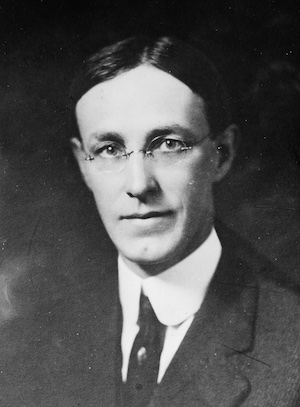By Lauren Toneatto
If you are an incoming undergraduate student at Brown University, chances are you have heard the term “Meiklejohn” before even setting foot on campus. As part of the Meiklejohn Peer Advising Program, every first-year student is automatically paired with a Meiklejohn advisor, an upperclassmen peer mentor, to help them navigate their transition to college and throughout their first year. But, outside of Brown’s Providence community, Meiklejohn might be an unfamiliar term to most; and Brown undergraduates may not realize that Meiklejohn is more than in-the-know Brown lingo—it is actually a last name.
An advocate of free speech, Alexander Meiklejohn (1872–1964) dedicated his life to learning and innovation. Meiklejohn was the youngest of eight sons, and his family pooled their resources to provide him with an education. His family’s efforts proved fruitful as Meiklejohn graduated ΦΒΚ from Brown University in 1893. In line with Phi Beta Kappa’s motto, “Love of Learning is the Guide to Life,” he continued his education at Brown by earning a master’s degree in philosophy before completing a Ph.D. at Cornell in 1897. Once more, Meiklejohn returned to Brown as the second Dean of the University, where he served in the role from 1901 until 1912.
A year later, Meiklejohn began his over ten-year term as president of Amherst College. Amherst ultimately forced Meiklejohn to resign, citing his “innovative ideas regarding curriculum and teaching methods” as a reason for his removal. Upon his resignation in 1923, eight faculty members left, and thirteen students refused their diplomas, revealing Meiklejohn’s innovative impact on the institution. In alignment with his advocation for free speech seen within his writings, Meiklejohn established the University of Wisconsin’s Experimental College in 1928. Differing from other college curriculums, here students studied a single topic in-depth at a time, and there were no formal classes. Despite the program inspiring students, the experimental college ended in 1932. Nevertheless, today the University of Wisconsin houses its Integrated Liberal Studies Program, an interdisciplinary program heavily influenced by Meiklejohn’s Experimental College, which emphasizes a broad yet integrated education.
Highlighting learning and the liberal arts, Meiklejohn’s legacy lives on through additional university programs, perhaps most prominently at his alma mater. The Meiklejohn Peer Advising Program is Brown’s largest student organization, with every first-year student participating alongside 350 Meiklejohn advisors. In practicing self-reflection and empathy for others, Meiklejohn advisors further the overall goal of enabling students to work towards a liberal education; Meiklejohn continually championed education in the arts and sciences; thus, naming this experimental program after him serves as a fitting tribute.
Given the Meiklejohn Program’s assistance in navigating a liberal education, it is no surprise that several Brown University ΦΒΚ members actively serve as Meiklejohn advisors. Beginning this academic year, the Meiklejohn program will pay its advisors to make the position more inclusive and in the hopes of providing a more personalized approach to advising.
When Zachary Reiss (ΦΒΚ, Brown University) arrived at Brown, he said, “I knew I wanted to give back to the Brown community, and advising as a Meiklejohn was a great way to do that. Meiklejohns can be valuable in reassuring first years that it’s okay to go outside of their comfort zone and try classes they otherwise wouldn’t take.” Edan Larkin (ΦΒΚ, Brown University) agrees that helping first years navigate an innovative curriculum, as Meiklejohn himself advocated for, is one of the best parts of being an advisor. Recognizing how a broader perspective can encourage students to try topics outside their comfort zones, Larkin elaborates: “As a peer advisor, I am not an authority but a classmate and a resource to my advisees. The Meiklejohn program allows incoming first years to see that many students before them figured it out and got where they needed to be. It reassures them that they have time to explore their options and find what they truly love.” Tiffany Chan (ΦΒΚ, Brown University) encourages new students to explore a broad range of subject matters as “we try to emphasize to use their first couple semesters on campus to really explore what is available to them,” she said. Embracing a well-rounded approach, Chan adds, “What makes the Meiklejohn program special is that it isn’t just an academic advising organization – its purpose is to provide holistic advising whether it be academic, social, or emotional.”
As secretary of Brown University’s Phi Beta Kappa chapter, Professor Stephen Foley (ΦΒΚ, Brown University) recognizes the value of intellectual exploration, a sentiment he continues to promote by serving as a faculty partner in the Meiklejohn Program, working alongside student advisors to aid first-years for the duration of the academic year. Like Larkin and Chan who foster freedom of thought by giving students agency to discover, Foley believes that the Meiklejohn Program is “an institutional marker for the kinds of advising, formal and informal, that underlie the classroom,” he said. “For first-year students, it’s a timely launching pad to the many kinds of advice they will receive from peers and instructors as they enter the curriculum, reminding them at this critical transition of how to seek and how to receive advice. In the end, the choices belong to the student.”
Lauren Toneatto is a recent graduate of Brown University with a double concentration in the history of art and architecture and in English. She was inducted into Phi Beta Kappa there in June 2022. Brown University is home to the Alpha of Rhode Island chapter of Phi Beta Kappa.




